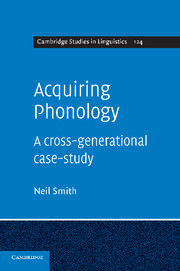3 - Competing theories
Published online by Cambridge University Press: 04 August 2010
Summary
The modifications suggested by Macken and others preserved the basic rule-based generative framework of APh. I look next at other proposed generative revisions before turning to constraint-based and usage-based alternatives.
Rule-based (generative) theories
Rule-based (‘generative’) theories have the great advantage of being explicit and descriptively rich: there is almost nothing they cannot describe. This, of course, makes the problem of explanation more acute, and even the descriptive richness doesn't guarantee that the correct natural classes of data or phenomena will be characterised by the theory. For example, my description of consonant harmony in APh achieved at best descriptive adequacy. Spencer (1986; see also Smith, N. V., 1989: 125f.; Goad, 1997) provided evidence for a change in the – still generative – theory used in child phonology: the need to appeal to autosegmental representations rather than relying on the purely linear approach of SPE phonology. Spencer emphasised the fact that some of the formal statements of consonant harmony were baroque in their complexity. In particular, the rule ensuring that [l] emerged for all of /l, r, j/ in examples like [lɛluː] for yellow and [lɔliː] for lorry had to be complicated because the harmony operated in both directions: from left to right in lorry, from right to left in yellow. But the process is intuitively a unitary one, and he suggested that if ‘laterality’ were treated autonomously such that the feature [lateral] was associated with all the consonants in the domain simultaneously this unity could be satisfactorily captured.
- Type
- Chapter
- Information
- Acquiring PhonologyA Cross-Generational Case-Study, pp. 30 - 49Publisher: Cambridge University PressPrint publication year: 2009

